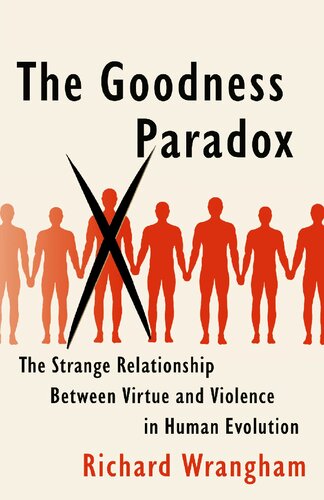
The Goodness Paradox
The Strange Relationship Between Virtue and Violence in Human Evolution
کتاب های مرتبط
- اطلاعات
- نقد و بررسی
- دیدگاه کاربران
نقد و بررسی

October 29, 2018
Wrangham (Catching Fire), a biological anthropologist at Harvard, undertakes a thorough and persuasive examination of this paradoxical observation: “we can be the nastiest of species and also the nicest.” He notes that “compared with other primates, we practice exceptionally low levels of violence in our day-to-day lives, yet we achieve exceptionally high rates of death from violence in our wars.” Wrangham argues that there are two types of aggression, reactive and proactive. The former reacts to an immediate threat while the latter connotes “violence that is coolly planned.” Wrangham builds the case that human evolution has selected against reactive aggression, in turn causing a self-domestication process akin to how humans tamed many animal species. Its key component was the human ability to form coalitions and thus impose sanctions, including capital punishment, on the overly aggressive. While “cooperation was a key to Homo sapiens’s domination of the earth,” it also gave humans “war, caste, the butchery of helpless adults, and many other forms of irresistible coercion.” Wrangham does not, however, propose that readers passively accept sanctioned violence as a necessary aspect of modern-day societies, concluding his well-argued treatise by rejecting the continued use of capital punishment and asserting that the “important human quest... is reducing our capacity for organized violence.”

November 1, 2018
"If we evolved to be so good, why are we also so vile?" Wrangham (Biological Anthropology/Harvard Univ.; Catching Fire: How Cooking Made Us Human, 2009, etc.) looks at the nobler--and ignobler--characteristics of our kind.The fact that we have societies--and such things as schools, medicine, music, and the like--is evidence, by the author's account, that humans have evolved a vast capacity to collaborate and cooperate, with attributes including "tolerance, trust, and understanding." So it has been since the Pleistocene, he adds, though of course humans have also evolved in ways that allow us to band together to perform unspeakable acts of violence and cruelty. Wrangham closely examines the social behavior of chimpanzees, who are far more disposed to violence than humans, as well as the ways of bonobos and other simians. "The human rate of physical aggression," he writes, "within social communities is...strikingly low." He also looks into the neurobiology of violence, implicating the amygdala, prefrontal cortex, and other brain structures, and at the biological and cultural implications of "self-domestication," a process by which humans school themselves out of their feral nature and into habits of being that moderate violence--though, as he adds, while other domesticated species such as dogs and guinea pigs are "delightfully tractable," human adaptability and cultural learning add up to something more. Yet, he notes, both intelligence and adaptability contribute to our inclination toward "coalitionary proactive aggression," which enables us to plan acts of violence against victims who cannot fight back. The resultant outbursts of war and other violence are expressions of the human penchant for "vying for power," but that contest doesn't preclude cooperative behavior: "To avert episodes of violence," concludes the author, "we should constantly remind ourselves of how easily a complex social organization can decay, and how hard it is to construct."Wrangham's book adds materially to a conversation that includes Steven Pinker's The Better Angels of Our Nature, Matthieu Ricard's Altruism, and other recent texts on human behavior.
COPYRIGHT(2018) Kirkus Reviews, ALL RIGHTS RESERVED.

People, like animals, have adapted to survive over time. Wrangham (anthropology, Harvard Univ.; Catching Fire: How Cooking Made Us Human) examines matters such as domestication, cooperation in groups, and how managing different types of aggression has shaped how species thrive. Wrangham has clearly done his research. In addition to citing both past and current scientific and field studies, he notes various thinkers and writers, such as Jean-Jacques Rousseau, Charles Darwin, Mark Twain, and Rudyard Kipling. The hefty back matter comprises more than 60 pages of bibliography and notes, with topics covered ranging from biology and war to capital punishment. Various species are examined in depth, especially chimpanzees and other primates, sometimes more so than humans, which makes the subtitle somewhat misleading. The author aims to provide a work accessible to those outside the scientific field, offering a great deal of information. However, some readers might struggle with the dense, scholarly writing style. VERDICT For academic-minded readers.--Elissa Cooper, Helen Plum Memorial Lib., Lombard, IL
Copyright 1 Library Journal, LLC Used with permission.
























دیدگاه کاربران